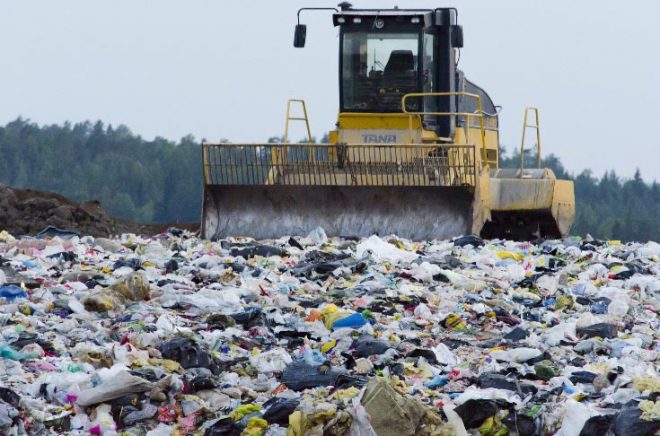
4/17/19 China’s National Sword Guts Global Recycling
Recycling across the material spectrum has become second nature to individuals and businesses. Every week, individuals and businesses toss paper, metals, plastics and glass into recycling bins or have e-waste such as computers and phones hauled to e-cyclers believing it will be transformed into something new.
We do it to help planet Earth.
On January 1, 2018, this convenience ended abruptly when China’s National Sword Policy went into effect. It banned the importation of 4 categories totaling 24 types of solid waste that include plastic, paper and textiles. In a move that shocked the West, the world’s largest importer of paper and plastic waste said, “We don’t want your trash anymore.”
Almost overnight, recyclers had no one to buy their discarded material including huge volumes of business-generated e-waste and nowhere to deliver it. Company owners appeared in news clips dwarfed by mountains of bundled plastic and paper waiting to go somewhere other than China, which had previously absorbed two-thirds of the worlds paper and plastic waste.
What changed China’s mind?
They decided they want to be pristine. They want to be environmentally pure. They want their environment to be cleaner and healthy, just like the West. Some pointed to an eye-opening 2016 documentary called, “Plastic China.” It follows two young families involved in an informal plastic recycling factory and the health and other risks they encounter as they recycle soiled, contaminated and harmful waste.
Until this policy change, many in the Western world did not understand that recycling had been linear rather than circular. Much of our individual and business waste got carted off to developing countries with less stringent pollution policies.
Out of Sight – Out of Mind.
Ironically, the current chaotic situation in today’s recycling industry can be traced in part to its success. The rise of single-stream recycling attracted more residents and businesses into the “do good for the earth” fold. It was easy to dump paper, plastic, glass, and aluminum into one curbside bin. Gone were the days of time-consuming multi-bin sorting.
Unfortunately, lax rules encouraged the counter-productive habit of wish-cycling. If trash patrons weren’t sure it was recyclable, but thought it should be, they tossed it into the bin anyway assuming someone at the other end could to fix their mistake.
They assumed wrong.
It either clogged or damaged sorting machines or, worse, managed to slip through and contaminate the entire batch of recyclables and, ultimately, the country it landed in – most notably, China. With the introduction of National Sword, recyclers in other southeast Asian countries found themselves stepping forward to fill the void. But they couldn’t handle the displaced volume and, subsequently, announced they, too, we’re shutting their doors to waste.
Who can blame them?
Businesses and governments in the West find themselves in dire recycling straits. It’s as if the unthinkable has happened. Recyclables now get burned at incineration plants, jammed into various containers and dumped into landfills with governments scrambling to set after-the-fact policies and offer assistance to struggling businesses.
E-waste, which contains 20% plastics, continues to grow at unprecedented rates with fewer and fewer disposal destinations. As businesses go paperless, the rely more on computers made of plastic that have shorter and shorter lifespans. While there might have been a time when money could be made from extracting precious metals from e-waste, now the costs outstrip the profits.
What will it cost to dispose?
A lot more.
The upheaval in the recycling industry, including e-cycling, will drive up disposal costs for everyone across the board, no matter what the material. E-cyclers have begun upping prices to reflect their own disposal challenges. Where do they send other businesses’ e-waste?
E-waste managers like Castaway Technologies work as liaisons between our clients and E-cyclers, organizing the removal and recycling of electronics through our IT Asset Disposition (ITAD) Services. When their costs go up, unfortunately, ours do as well.
What can be done in the near future?
Like every problem, it can be solved by looking through a different solution lens. We know the linear, disposable economy produced the recycling/e-waste crisis. Perhaps, it’s time to move toward a circular, non-disposable economy.
Innovative businesses have already moved in this direction by developing product packaging, including plastics, that easily breaks down, that is compostable or that replaces disposable packaging with reusable containers. More innovations are on the way as ingenuity has a funny habit of showing up when you need it most.
Castaway Technologies closely follows local and global challenges as well as solutions for solid waste, specifically for e-Waste removal and disposal through e-cyclers. No matter the current challenges, we are 100% committed to applying responsible best practices and keeping in full regulatory compliance on behalf of our clients.
If you have any questions about our certified e-waste removal programs, feel free to call a Castaway ITAD specialist at 978-208-4730.
For further Information:
Massachusetts Department of Environment Protection Offers Recycling Business Development Grants.
Recycle Smart: Great resource for individuals and small businesses.
The Global Cost of Electronic Waste: Article in The Atlantic that sifts through the growing disposal problem.


